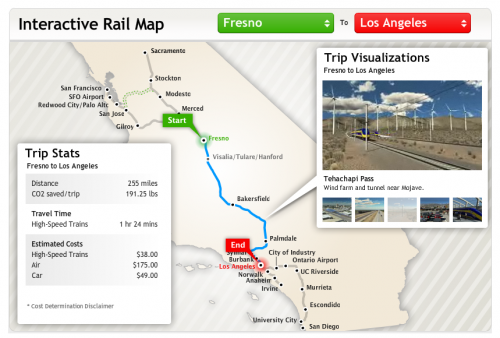Audit: California high-speed rail zooming toward disaster without major changes
California's bullet-train project could careen off the tracks because the high-speed rail administration suffers from "weak oversight," "lax" management and a shaky funding plan, according to a scathing state audit.
The report repeatedly attacks the California High-Speed Rail Authority for misusing public funds and relying on a "vague" and "optimistic" plan to pay for the railroad. It should give the project's die-hard detractors more ammunition against passionate, job-hungry supporters in a statewide clash that has been particularly fiery in the Peninsula and South Bay.
"This confirms what the Legislature has suspected: that the high-speed rail authority needs more oversight and should be retooled to transform itself," said state Sen. Alan Lowenthal, D-Long Beach, chairman of the Transportation and Housing Committee, which called for the audit last summer. "We've got to get their act in order."
The rail authority has about one-fourth of the funding for the $43 billion project and plans to begin construction by fall 2012.
Click here to read the complete story with maps and related graphics.
Click here to see an interactive map of the proposed high-speed railway route.
State Auditor Elaine Howle, in a 40-page report submitted to the Legislature and governor, says the authority's plans to secure an additional $15 billion to $17 billion in federal money are not based on any concrete government plans. She says the other major chunk of necessary funding — $10 billion to $12 billion in private financing — is based on profit guarantees the authority has "scant" evidence it can deliver to investors.
The auditors also accuse the authority of "misusing" part of the $9 billion in state bond money voters approved in November 2008 to launch the project. Authority officials, for example, paid $46,000 for a program manager's office furniture even though the contract stated that the contractor would pay for the furniture, the audit says.
Auditors also investigated a sample of 22 agreements the rail authority entered into with contractors around the state. The authority had written proof that it checked only two of the projects to verify they were completed, but paid out $6.9 million to the other 20 contractors without evidence the work was finished.
Among other findings, the auditors say the rail authority:
- paid contractors $268,000 for work not outlined in contracts, which auditors say jeopardizes the board's ability to hold contractors accountable for their original work plans
- does not have any way to track its administrative and planning spending, which will total $168 million by the end of June, putting the authority at risk of running out of such funds
- only appointed five of eight members to a state-required oversight committee, which has been illegally meeting in private and as a result could have its work voided
- monthly status reports by program managers often contained "inaccurate and inconsistent information"
In 10 recommendations, the auditors urged the authority to come up with alternative financing plans, increase oversight and track its spending better.
In a response, rail authority Chairman Curt Pringle, the mayor of Anaheim, acknowledged most of the problems and said authority staffers are working to improve them and are implementing some of the audit's recommendations.
For instance, the authority plans to have an online database to track spending running by May.
On the funding issue, authority leaders said they would look for other financing plans. But, they said, the formula would not change — only the timeline for receiving funding, which they cautioned would cause project delays and increase costs because of inflation, they said.
Authority officials also used the release of the audit as an opportunity to again lobby for more funding, saying the government body of fewer than a dozen employees is drastically understaffed to handle the state's largest project. It spends 95 percent of its money on contractors.
Pringle took issue with what he called an inflammatory title of the report, saying many people might read just the headline and not the report. The title says the authority "risks delays or an incomplete system because of inadequate planning, weak oversight and lax contract management."
On the oversight committee, the authority said it received advice from its attorney that the board was not subject to open government laws, contrary to the opinion of the auditor's legal counsel. The authority agreed to look further into the issue and work with the Legislature to fill out the committee roster.
"The authority is committed to building the high-speed train system in a responsible way that reflects the will of the people of the state," Pringle's response said.
Robert Cruickshank, chairman of Californians for High-Speed Rail, called the criticisms in the audit "generally sensible." He chalked up some of the rail authority's oversight problems to "growing pains."
But Cruickshank said he found it "weird" that the audit held the rail authority responsible for the shortage of federal funding for the project.
"It's worth keeping in mind that California voters approved $10 billion in state funding at a time when there was no federal funding for high-speed rail and none had been proposed yet," he said. "Everybody realizes that if there is no additional federal funding, then the project falls."
The auditor's comments, he said, should have been directed toward members of Congress instead.
On May 11, the transportation committee will hold a hearing on the audit. Lowenthal said the committee will try to incorporate as many of the recommendations as possible without devoting more money.
"It's clear the Senate can't allow this project to become the 'Big Dig West,' " said state Sen. Bob Huff, R-Diamond Bar, vice chairman of the transportation committee, referring to the drastically overbudget freeway project in Boston.
The full audit is available at bsa.ca.gov.
Source: San Mateo County Times/San Jose Mercury News

















